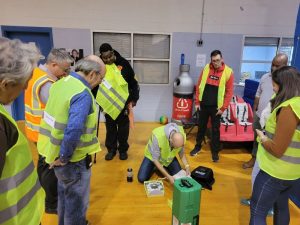
The Jewish Emergency Preparedness Project class of 2022 has graduated. Now the organization is looking for its class of 2023.
JEPP, a Philadelphia-based nonprofit providing security training to faith-based organizations, has opened up applications for their 2023 cohort. In 2022, 12 organizations in the Philadelphia area, such as synagogues, summer camps and schools, completed the training.
“We’re building a culture of preparedness,” said Yoni Ari, JEPP CEO.
“We are focusing mainly on crisis management and human behavior,” he continued. “We found that many Jewish organizations are investing a lot of time and money on security means — on hardening cameras, lawyers, et cetera — but nobody’s investing time on human behavior.”
Created at the end of 2021 by President Sherrie Savett and Vitaly Rakhman, JEPP aims to provide a broader and more thorough concept of security, addressing medical emergencies and natural disasters in addition to hate crimes, bomb threats or active shooters.
The nonprofit draws on the Talmudic principle, “All of Israel are responsible for one another,” according to a press release, meaning that communities must be committed to taking care of one another and their members.
In 2022, funding for JEPP came from $150,000 in donations as well as smaller grants, which helped subsidize the cost of the training for participating organizations. JEPP is looking to increase funding from grants in the coming year.
JEPP hopes to not only expand its training to 30 organizations, but also reach organizations outside of the Philadelphia community in New York, New Jersey, Maryland and Delaware.
During its 30 hours of training for participants, JEPP gives an evaluation of an organization’s campus, helps to design a customized set of procedures and conducts drills and exercises with staff members.
While training last year’s cohort, Ari, who has over 20 years of security training, including in the Israel Defense Forces, found that despite organizations having the physical materials to address emergencies, staff members were unaware of how to operate them. In one instance, synagogue staff were not properly trained in how to use a defibrillator in case of a heart attack; in another, staff members were unsure of how to operate the new doors installed to “harden” the facility against intruders.

| Courtesy of Rebecca Ash
In the first phase of training, JEPP works with an organization to take stock of the measures and procedures in place.
“It’s both hardening of equipment, but more learning to use what they have in the best and most efficient way,” Savett said.
In many instances, according to Savett, while having technologies can help keep people safe, communication and clear procedures are an equally big piece of the equation. If students have to evacuate a school building, how do staff effectively communicate with each other to carry out a plan? If it’s cold outside, how can teachers make sure students are prepared to brave the weather with winter coats?
Preparedness requires a written plan, as well as point people to effectively execute the plan.
“It starts with forming a crisis management team. Somebody has to know that they’re in charge of a crisis,” Savett said. “And there has to be coverage all the time, not just when a school is in session, because there are special events all the time at unusual times.”
Staff members need to know emergency contacts and how to perform a lockdown before an emergency happens.
“We’re trying to make preparedness a part of their daily life,” Savett said.
JEPP’s training often goes hand-in-hand with funding and infrastructure provided through the commonwealth’s Nonprofit Security Grant Program, but the two address different aspects of security needs.
Last year, the Kaiserman JCC in Wynnewood, a three-time recipient of Pennsylvania’s NSGP, was among JEPP’s 2022 cohort.
“We were, through the generosity and investment of the state, able to invest in physical infrastructure that helped make the Kaiserman JCC a more secure environment,” Kaiserman JCC CEO Alan Scher said. “The JEPP program was a learning endeavor.”
The yearlong JEPP training helped the JCC staff consider how to best use their enhanced security as well as connect more of their staff to updated emergency procedures.
After a five-year trend of increasing antisemitism, according to the Anti-Defamation League, as well as physical threats to Jewish spaces, such as the Colleyville, Texas hostage crisis in January 2022, security continues to be of greatest concern to Jewish organizations.
“Ensuring that emergency procedures, safety and security is top of mind in our muscle memory…this is critical,” Scher said. “It’s top priority.”
Applications for JEPP’s 2023 cohort can be found at forms.wix.com/f/7008204234743087213.






